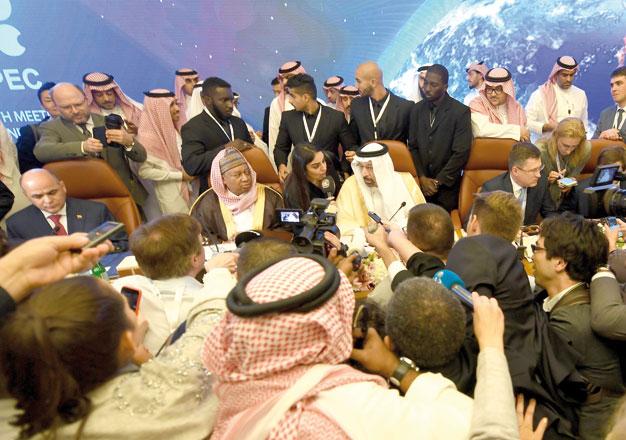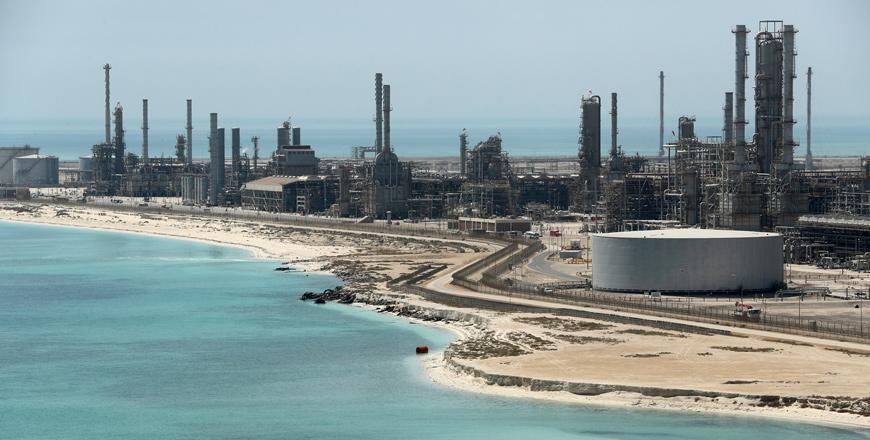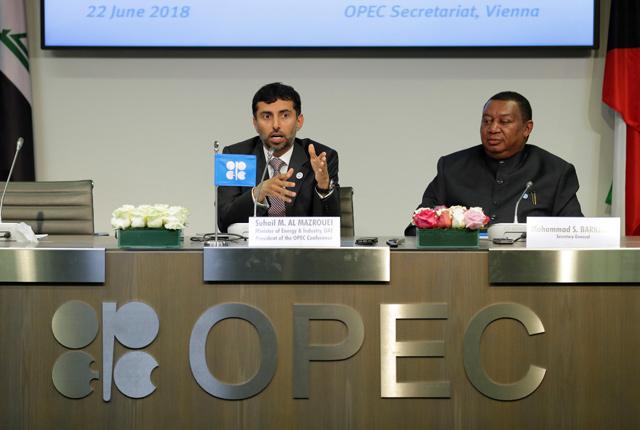You are here
Saudi Arabia, UAE see sufficient oil supplies, rising stocks
By AFP - May 19,2019 - Last updated at May 19,2019

Saudi Energy Minister Khalid Al Falih speaks to the press during the one-day OPEC+ group meeting in the Saudi city of Jeddah, on Sunday (AFP photo)
JEDDAH, Saudi Arabia — Oil supplies were sufficient and stockpiles were still rising despite massive output drops from Iran and Venezuela, said OPEC kingpin Saudi Arabia and key producer UAE on Sunday, as oil exporters met in Jeddah.
Producer nations gathered to discuss how to stabilise a volatile oil market amid rising US-Iran tensions in the Gulf, which threaten to disrupt global supply.
But "we see that [oil] inventories are rising and supplies are plenty," Saudi Energy Minister Khalid Al Falih told reporters at the start the meeting.
"None of us wants to see the [oil] stocks swell again," he added, with reference to a supply surplus that sent prices sharply lower in the second half of last year.
"We have to be cautious," Falih said.
The UAE's energy minister said there was no need to relax a deal by the OPEC+ group of oil exporting countries to cut output by 1.2 million barrels per day to support prices.
"We have seen inventory building. I don't think it makes sense" to alter the existing deal, said Suheil Al Mazrouei.
The meeting comes days after sabotage attacks against tankers in highly sensitive Gulf waters and the bombing of a Saudi pipeline — the latter claimed by Iran-aligned Yemeni rebels.
But Falih reiterated on Sunday that the kingdom's oil installations were well protected.
"We have strong [oil] industry security," he told reporters.
"Everybody is vulnerable to extreme acts of sabotage."
The meeting also comes as the full impact of reinstated US sanctions against Tehran kick in, slashing the Islamic republic's crude exports.
Iran exports tumble
But Iran — which did not send a representative to the meeting — was still expected to dominate the one-day meeting of the OPEC+ group of oil producing nations.
The meeting is set to conclude by making recommendations for a key summit of oil producers in late June, to be attended by Iran.
Russian Energy Minister Alexander Novak said it was "premature" to talk about extending the deal, according to Interfax news agency.
Massive drops in exports by Iran and Venezuela come alongside output cuts of 1.2 million barrels per day implemented by the OPEC+ group since January.
The International Energy Agency (IEA) said earlier this month that global oil supply fell in April due to the effect of US sanctions on Iran and the OPEC+ production cuts.
The IEA said Iranian crude production fell in April to 2.6 million bpd.
Iran's output is already at its lowest level in over five years, but could tumble in May to levels not seen since the devastating 1980-1988 Iran-Iraq war.
Energy intelligence firm Kpler sees Iranian exports plunging from 1.4 million bpd in April to around half a million bpd in May — down from 2.5 million in normal circumstances.
Venezuela's output — also subject to US export sanctions — is also tumbling, down by over half since the third quarter of last year.
Kpler data shows OPEC+ members have kept to agreed production cuts.
But exporters fear a rush to raise production to plug the gap left by Iranian exports could backfire, triggering a new supply glut.
Related Articles
DUBAI — Saudi Arabia plans to cut its crude oil exports in April to below 7 million barrels per day (bpd), while keeping its output well bel
LONDON — The Organisation of the Petroleum Exporting Countries (OPEC) on Monday predicted global demand for its crude oil will be less than
VIENNA — The Organisation of the Petroleum Exporting Countries (OPEC) agreed with Russia and other oil-producing allies on Saturday to raise













